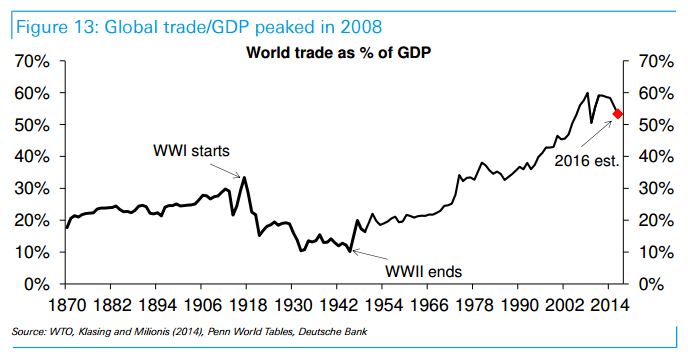It is not just recent “populist” elections in the UK and the US that is signaling a move towards de-globalization, but a decided downtrend in the ratio of global trade to GDP in recent years also points to this trend. But is the trend real? A Deutsche Bank report notes both the quantitative and qualitative aspects of the de-globalization trend but also points to globalization trends that continue in the face of political headwinds. Part of the de-globalization trend is based on the thesis that the Trump administration going to be full-blown protectionist, but Deutsche Bank challenges this common notion.
Signs of De-Globalization
There are highly public signs that point to a trend towards de-globalization. Perhaps most notable is the Brexit vote, where the majority of UK residents determined the country needs to look inward, closing their minds towards immigration and integration with the European Union.
After this electoral surprise came the improbable campaign of Donald Trump. Trump openly embraced the Brexit result, comparing his electoral chances to those of the Brexit result and embracing its leaders such as Nigel Farage. Trump further campaigned significantly on a trade protectionist agenda.
Listen to Stratfor’s Reva Goujon: Major Geopolitical Changes Coming in 2017
With these two de-globalization trends measuring public opinion – and votes in Italy, France and Germany potentially providing a clearer view – there is also trade documentation figures pointing to slowing globalization.
“International bank-related capital flows have clearly been in decline since the GFC (Great Financial Crisis), driven by regulatory tightening and balance sheet contraction,” write the bank’s Chief Economists Peter Hooper, Michael Spencer, and Torsten Slok, pointing to a point of global de-globalization. Another sign of de-globalization the report highlighted was a recent downtrend in the ratio of global trade to GDP.
These factors taken alone, however, don’t tell the whole story.
Election results Not Crystal Clear Mandates
When the Brexit vote in the UK took place, it was only a slim majority who voted in favor of exiting the EU — and there were many nuanced reasons for doing so, not just de-globalization. In fact, after the vote there was a reported buyer’s remorse, pointing to much less a mandate for de-globalization.
While Trump campaigned heavily on de-globalization themes, his actions since in Cabinet appointments paint a more nuanced picture. While he has clearly stated he will pull out of the Trans-Pacific Partnership, his true commitment to de-globalization remains a question mark.
“Expectations are growing that the Trump Administration and Republican Congress will find ways to scale back financial regulations that could reverse some of the global financial disintegration of recent years, though perhaps not without some risk to financial stability down the road,” the report said. In fact, Trump’s campaign bark on protectionism is expected to be worse than his bite. “We assume that the new president will choose not to push very far down a protectionist path that could prove quite counterproductive.”
Contrary to fairly strong signals in the direction of de-globalization on the “real” side — measurable in international trade in goods and services — signs of de-globalization in financial transactions are much more mixed, stated the November 28 report, “Global financial integration and disintegration.”
Read Italian Referendum Next Test of Global Populism
Another statistic pointing to growing global financial integration can be found in securities transactions, which has continued to advance. The move has been driven in part by growing saving-investment imbalances and increasing spreads in yields on financial assets across countries. “Growth in cross-border holdings of securities has likely more than made up for the decline in bank-related transactions,” the report said. “The desire to diversify financial portfolios internationally should remain a strong inducement to global financial integration.”
While the headlines may point to growing de-globalization, Deutsche Bank says the truth might be more nuanced. “The recent election outcome in the US points to risks in both an integrating and disintegrating direction,” the report said, pointing to the negative economic consequences if Trump’s campaign rhetoric turns into reality.
By Mark Melin









